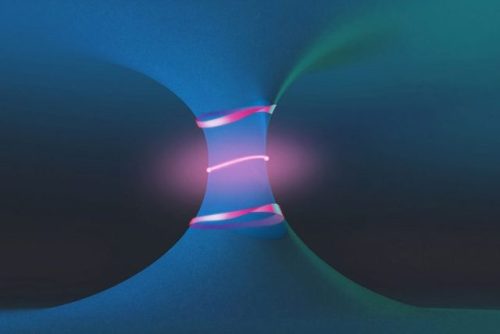Imagine The Lightsabers From This
Imagine the lightsabers from this

Scientists Observe New Exotic Phenomena in Photonic Crystals
Topological effects, such as those found in crystals whose surfaces conduct electricity while their bulk does not, have been an exciting topic of physics research in recent years and were the subject of the 2016 Nobel Prize in physics. Now, a team of researchers at MIT and elsewhere has found novel topological phenomena in a different class of systems — open systems, where energy or material can enter or be emitted, as opposed to closed systems with no such exchange with the outside.
This could open up some new realms of basic physics research, the team says, and might ultimately lead to new kinds of lasers and other technologies.
The results are being reported this week in the journal Science, in a paper by recent MIT graduate Hengyun “Harry” Zhou, MIT visiting scholar Chao Peng (a professor at Peking University), MIT graduate student Yoseob Yoon, recent MIT graduates Bo Zhen and Chia Wei Hsu, MIT Professor Marin Soljačić, the Francis Wright Davis Professor of Physics John Joannopoulos, the Haslam and Dewey Professor of Chemistry Keith Nelson, and the Lawrence C. and Sarah W. Biedenharn Career Development Assistant Professor Liang Fu.
Read more.
More Posts from Redplanet44 and Others
Types as Ya Boy Bill Nye quotes
ESFJ:

ESFP:

ESTJ:

ESTP:

ENFJ:

ENFP:

ENTJ:

ENTP:

ISFJ:

ISFP:

ISTJ:

ISTP:

INFJ:

INFP:

INTJ:

INTP:

Types as Ya Boy Bill Nye quotes
ESFJ:

ESFP:

ESTJ:

ESTP:

ENFJ:

ENFP:

ENTJ:

ENTP:

ISFJ:

ISFP:

ISTJ:

ISTP:

INFJ:

INFP:

INTJ:

INTP:

Tumour Markers
Chemical biomarkers that can be elevated by the presence of one or more types of cancer, produced directly by the tumour or by non-tumour cells as a response to the presence of a tumour. Really great tests as can use just blood/urine, but aren’t the most specific and false positives do occur.

Alpha-fetoprotein (AFP)
Glycoprotein synthesised in yolk sac, the foetal liver, and gut - will be high in a foetus and during pregnancy.
<10 ng/mL is normal for adults
>500 ng/mL could indicate liver tumour
Normally:
Produced primarily by the liver in a developing foetus
Thought to be a foetal form of albumin
suppress lymphocyte activation and antibody production in adults (immune suppressant)
Binds bilirubin, fatty acids, hormones and metals
In cancer:
Detects hepatocarcinoma (liver cancer)
Risk factors: haemochromotosis, hep B, alcoholism - cell repair and growth from this damage leads to cancers
Present in non-pathogenic liver proliferation, including the growth and repair response to the above. This makes it hard to differentiate - AFP levels can be raised in patients with liver cancer risk factors due to the factors themselves, not a cancer. Not very diagnostic!! Used in combination with other tests/factors. Sensitivity and specificity ~75%
Other hepatocellular carcinoma markers:
γGT (γ-glutamyltransferase) - biliary damage
AFP mRNA (not always together with AFP! Might not be activated)
γGT mRNA elevated
Raised cytokines (IL-8, VEGF, TGF-B1)
ALT and AST elevated - liver disease
Carcinoembryonic antigen (CEA)
a set of highly related glycoproteins involved in cell adhesion. Potentially associated with innate immune system.
Normally:
produced in gastrointestinal tissue during foetal development
production stops before birth
present only at very low levels in the blood of healthy adults.
Cancer:
Elevated in almost all patients with colorectal cancer
Can monitor recurrence of cancer (when compared to previous test results for that patient) with a sensitivity of 80% and specificity of 70%
levels may also be raised in gastric, pancreatic, lung, breast and medullary thyroid carcinomas
also some non-neoplastic (not cancer) conditions like ulcerative colitis, liver disease, pancreatitis, COPD, Crohn’s disease, hypothyroidism - again, high risk groups for colorectal cancer - not a diagnostic test
Levels elevated in smokers.
Carbohydrate antigens (CA)
Including:
CA 19-9 - Pancreas
CA 15-3 Breast
CA 50 - Colorectal
CA 125 - ovarian
Levels rise only in disease states and particularly cancer, but will not rise in all patients.
Part 2 coming soon!




(via MIT researchers turn water into ‘calm’ computer interfaces)
…The Tangible Media Group demonstrated a way to precisely transport droplets of liquid across a surface back in January, which it called “programmable droplets.” The system is essentially just a printed circuit board, coated with a low-friction material, with a grid of copper wiring on top. By programmatically controlling the electric field of the grid, the team is able to change the shape of polarizable liquid droplets and move them around the surface. The precise control is such that droplets can be both merged and split.
Moving on from the underlying technology, the team is now focused on showing how we might leverage the system to create, play and communicate through natural materials…
Hey ISS, I'm looking at you!
![How To Identify That Light In The Sky [750 × 702] Visit Http://spaceviewsandbeyond.blogspot.com/2017/09/how-to-identify-that-light-in-sky-750.html](https://64.media.tumblr.com/05baaab06b7833133047b40e82461e65/tumblr_owry6wNqxo1w094hwo1_500.jpg)
How to Identify that Light in the Sky [750 × 702] Visit http://spaceviewsandbeyond.blogspot.com/2017/09/how-to-identify-that-light-in-sky-750.html for more space pics
Panorama of Jupiter

Jupiter seen by NASA’s Voyager spacecraft
Animation taken from video: Jeff Quitney
A woman in Nevada dies from a bacterial infection that was resistant to 26 different antibiotics. A U.K. patient contracts a case of multidrug-resistant gonorrhea never seen before. A typhoid superbug kills hundreds in Pakistan. These stories from recent years — and many others — raise fears about the possibility of a post-antibiotic world.
The development of antibiotics in the early 20th century was one of the greatest leaps forward of modern medicine. Suddenly, common illnesses like pneumonia, strep throat and gonorrhea were no longer potential death sentences.
But even in the infancy of antibiotics, it was clear that their misuse and overuse could lead to antibiotic resistance and eventually create untreatable superbugs.
In this video, we explain how antibiotic resistance happens — and what we can do to avoid living in a post-antibiotic world.
Video: NPR

Cracking eggshell nanostructure: New discovery could have important implications for food safety
How is it that fertilized chicken eggs manage to resist fracture from the outside, while at the same time, are weak enough to break from the inside during chick hatching? It’s all in the eggshell’s nanostructure, according to a new study led by McGill University scientists.
The findings, reported today in Science Advances, could have important implications for food safety in the agro-industry.
Birds have benefited from millions of years of evolution to make the perfect eggshell, a thin, protective biomineralized chamber for embryonic growth that contains all the nutrients required for the growth of a baby chick. The shell, being not too strong, but also not too weak (being “just right” Goldilocks might say), is resistant to fracture until it’s time for hatching.
But what exactly gives bird eggshells these unique features?
To find out, Marc McKee’s research team in McGill’s Faculty of Dentistry, together with Richard Chromik’s group in Engineering and other colleagues, used new sample-preparation techniques to expose the interior of the eggshells to study their molecular nanostructure and mechanical properties.
Read more.
Re-generatively cooled RL10 Thrust Chamber Assembly test validates 3D printing process
West Palm Beach FL (SPX) Jun 18, 2018 Aerojet Rocketdyne recently achieved a significant milestone by successfully completing a series of hot-fire tests of an advanced, next-generation RL10 engine thrust chamber design that was built almost entirely using additive manufacturing; commonly known as 3-D printing. “This recent series of hot-fire tests conducted under our RL10C-X development program demonstrated the large-scale add Full article
-
 mileysyrups liked this · 7 years ago
mileysyrups liked this · 7 years ago -
 enginigger liked this · 7 years ago
enginigger liked this · 7 years ago -
 matyasnorte reblogged this · 7 years ago
matyasnorte reblogged this · 7 years ago -
 matyasnorte liked this · 7 years ago
matyasnorte liked this · 7 years ago -
 sciencenerd4-blog liked this · 7 years ago
sciencenerd4-blog liked this · 7 years ago -
 devourer-of-acetone reblogged this · 7 years ago
devourer-of-acetone reblogged this · 7 years ago -
 commarogue liked this · 7 years ago
commarogue liked this · 7 years ago -
 notgood222-blog liked this · 7 years ago
notgood222-blog liked this · 7 years ago -
 devourer-of-acetone liked this · 7 years ago
devourer-of-acetone liked this · 7 years ago -
 ormeir reblogged this · 7 years ago
ormeir reblogged this · 7 years ago -
 ormeir liked this · 7 years ago
ormeir liked this · 7 years ago -
 redplanet44 reblogged this · 7 years ago
redplanet44 reblogged this · 7 years ago -
 veritascorpion liked this · 7 years ago
veritascorpion liked this · 7 years ago -
 creativelifemuses liked this · 7 years ago
creativelifemuses liked this · 7 years ago -
 materialsscienceandengineering reblogged this · 7 years ago
materialsscienceandengineering reblogged this · 7 years ago